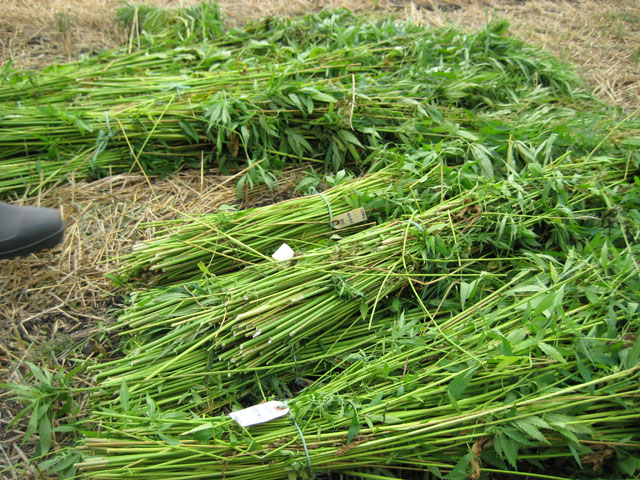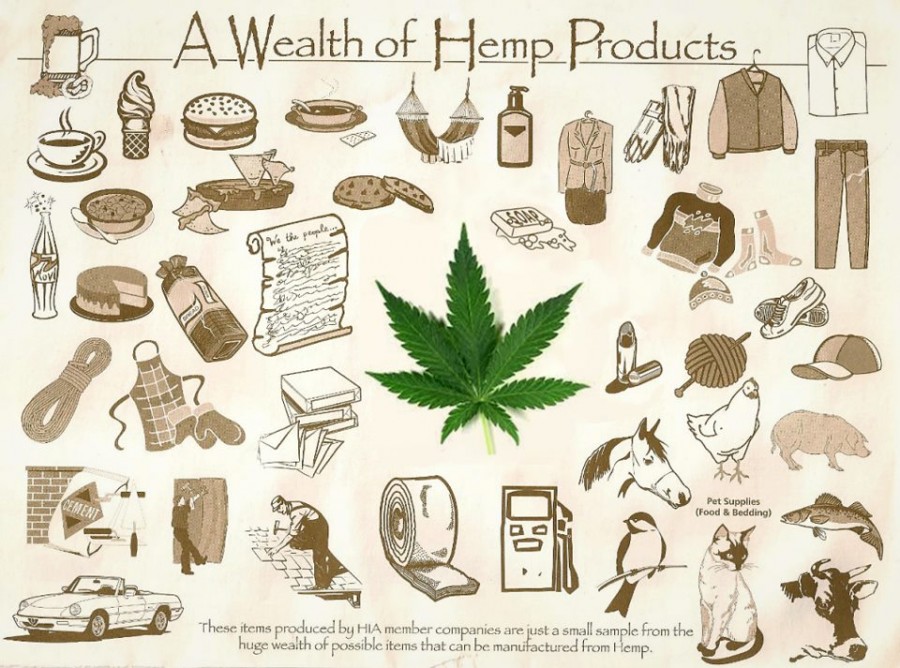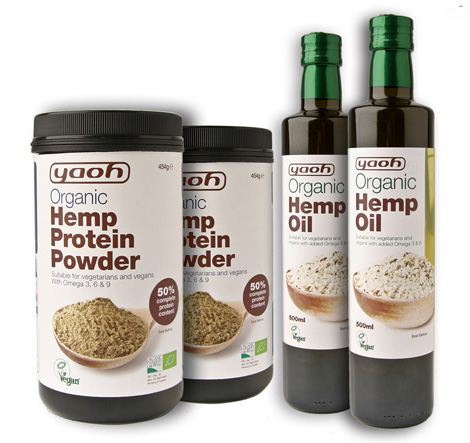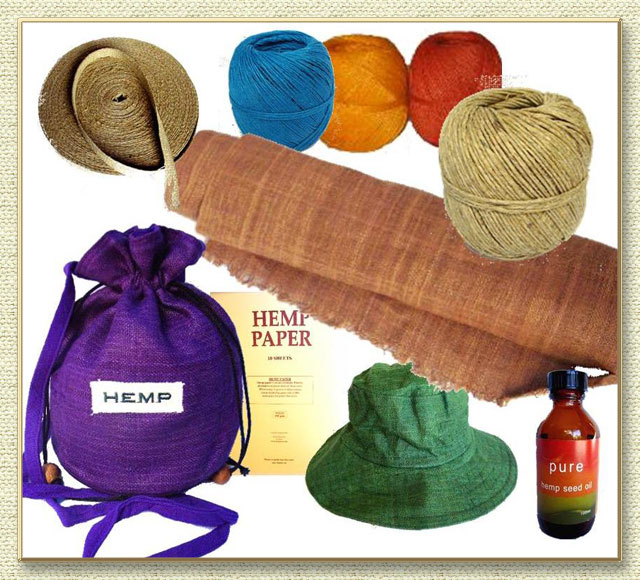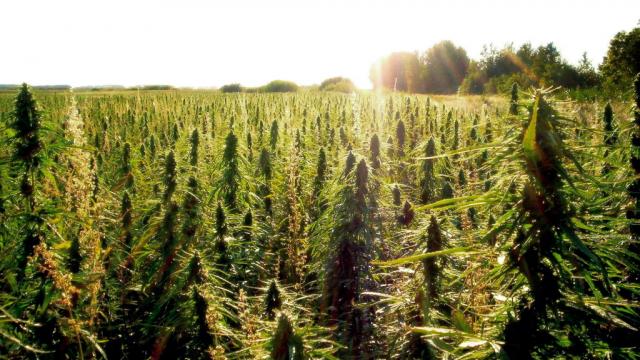
While much of the country has focused on the issue of whether to legalize marijuana for medical and recreational use, lawmakers in some states, such as Vermont, have pushed for the nullification of the federal ban on marijuana’s cannabis cousin: hemp.
Though smoking an entire garbage bag of hemp would not produce an altered state of consciousness, the 1970 Controlled Substances Act banned the production of industrial hemp after labeling hemp a dangerous threat. This was part of a propaganda campaign used by large corporations whose profits were being reduced because of the usefulness of hemp. They did this by associating hemp with marijuana.
Before the ban and classification of hemp as a Schedule 1 drug under the Controlled Substance Act of 1970, hemp was the most important cash crop in the U.S. economy — more valuable than corn and wheat combined, since it was both a versatile and adaptable crop.
The Hemp Industries Association (HIA) estimated that the retail value of North American hemp food, vitamin and body care products was in the range of $121 to $142 million in 2010. When clothing, auto parts, building materials and other non-food or body care products are included, the HIA estimates that the total retail value of U.S. hemp products is about $419 million.
Nine states thus far have lifted a ban on hemp, and 20 states introduced legislation during the 2013 session to allow hemp cultivation so farmers and other businesses can take advantage of the hemp market, since hemp can be used to produce thousands of items including paper, clothing, construction materials, automobile parts, foods and could even be used as a biofuel.
But no state has pushed as hard for hemp reform as Vermont, and lawmakers in the state say they are not waiting for the federal government’s approval like other states have historically done before they begin to produce hemp.
In June, Vermont’s democratic Gov. Peter Shumlin signed S.157 into law, which modified the requirements for hemp production in the state, by defining hemp as “an agricultural product which may be grown as a crop, produced, possessed, and commercially traded in Vermont.”
Shumlin said he signed the bill because, “I believe the growing of hemp should be legal. Hemp, a different variety of the same plant that produces marijuana, is not a drug but instead a crop with many constructive uses.”
Though Shumlin signed the legislation into law, making the production of hemp legal under Vermont law, he cautioned that the crop was still subject to federal anti-drug statutes. “That means that farmers who choose to grow hemp do so at their own risk and need to be aware of the possible consequences,” he said.
Because hemp has been classified as a Schedule 1 drug, farmers have to obtain a permit from the Drug Enforcement Agency (DEA) before they can legally grow and cultivate the plant, which some have called a nearly impossible feat.
“The reason we want to push for a change is that hemp is potentially a valuable crop,” Rep. Caroline Partridge, chairwoman of the Vermont House Committee on Agriculture and Forest Products said. “People want to grow it. Hemp oil is a valuable product, and there’s so much of the hemp plant that can be used for very, very productive purposes.”
Unlike corn, hemp doesn’t require farmers to use large equipment, which makes it a crop that is manageable for even small farmers, like Vermont farmer John Vitko, who says he wants to grow a small hemp crop to feed his chickens.
When asked if he was concerned about the DEA raiding his farm and enforcing the federal hemp ban, Vitko said “I’m going to be a little farmer that’s growing hemp, they’ve got bigger problems than me.”
Vermont: Hemp is the Way of the Future
Mike Maharrey is the national communications director for the Tenth Amendment Center. He said he thinks hemp is valuable and says hemp opponents’ argument that a market for hemp doesn’t exist in the U.S. is moot.
“How can you say there isn’t a market when you have never allowed one to exist,” he said, adding, “If we are importing half of another country’s entire production there is obviously a market. If not let’s lift the ban, and if the market isn’t there then it will simply vanish.”
Discussing Vermont’s bill, Maharrey called it more aggressive than other hemp legalization bills and said the legislation would allow “farmers to go straight ahead regardless of the federal law.
“This is a straight nullification bill. It gives them the green light as soon as they receive the license from the state. I think this development is extremely important for the states because you will see markets develop and flourish. If more states begin to follow this path then the federal government may be forced to lift the ban,” he said.
“The U.S. is the only industrialized nation that doesn’t allow cultivation of hemp. We have to import all of it,” Maharrey said. “In fact, the U.S. imports half of all Canada’s hemp. We have thousands of manufacturing companies and stores importing raw hemp and hemp products.
“Vermont and Colorado show the way forward. There is no question that the feds have no authority to ban a plant within a state’s borders. Doubt me? Ask yourself why it took a constitutional amendment to prohibit alcohol production.
“If enough states legalize hemp and farmers simply start producing it, the feds won’t be able to do a thing about it. Especially when markets begin developing and people see the incredible economic potential of this crop. Washington will either relent and repeal its ridiculous ban, or the so-called law will just wither on the vine like the federal prohibition of medical marijuana is doing now.”
Joey Pendleton is a hemp advocate and former Kentucky state senator. He reiterated Maharrey’s belief that a hemp market already exists in the U.S., but instead of growing the plant here in the U.S., it’s imported from China and Canada.
“There’s something wrong here, it’s crazy. Why are we the only industrialized country where you can’t grow it legally? Hell, we need to get in the 21st century,” he said.
According to Ray Hanson, with the Agricultural Marketing Resource Center, “The combined retail value of hemp food and body care products sold in the United States in 2010 was $40.5 million, up more than 10 percent from 2009, according to the market research firm SPINS. (The same firm estimated that 2009 sales of hemp products reached $36.6 million.)”
Historical Use
As Mint Press News previously reported, hemp isn’t marijuana and politicians are aware of this. A report from the Congressional Research Service says that “although marijuana is also a variety of cannabis, it is genetically distinct from industrial hemp and is further distinguished by its use and chemical makeup.”
Used since the 1600s, former Presidents George Washington and Thomas Jefferson noted they grew hemp on their land. Betsy Ross used hemp to create the first American flag and a draft of the Declaration of Independence was written on paper made from hemp.
If anything, the ban on the use of industrial hemp only proves how much power corporations have in Washington. Hemp was a major competitor of the paper industry, along with lumber, fossil fuels, steel, plastics, alcohol and food. Henry Ford constructed an early version of the Model-T almost exclusively from the hemp plant, even running the car on ethanol made from hemp.
The car was reportedly so strong, Ford could hit the car with an ax and not leave a dent, as hemp is supposedly 10 times stronger than steel, yet one-third the weight.
Because processed hemp creates such strong fibers, the material was also used to build homes, ships, planes and trains. Since its ban, corporations in sectors that oppose the legalization of the plant have seen profits increase.
3 WAYS TO SHOW YOUR SUPPORT
- Log in to post comments

